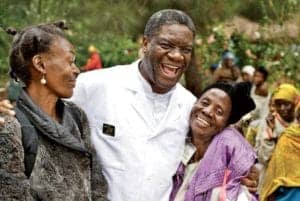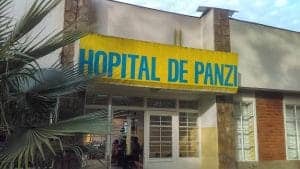by Abu-Jahlil Astrid Chacha
Dr. Denis Mukwege is congratulated for his work by people in his country, the Democratic Republic of the Congo, in Africa and worldwide. Now 62 years old, he is a charismatic man, seen as a hero.

He is called “the man who restores women.” In Eastern Congo’s Bukavu region near the border with Rwanda, he founded in 1999 the Panzi Hospital. In this hospital, without charge, he and his staff have treated, cured, and restored, physically and psychologically, more than 45,000 women and girls – babies, young and old women – victims of rape by soldiers during the second Congo war. All the women he treats consider him a messiah.
He said that when he started receiving the first cases of rape, he felt extremely shocked by the violence of the rapists. Women came with their genital organs totally destroyed. Soldiers used to shoot a bullet of gun in the victim’s vagina, put blades, burning toxic objects or salt in the vagina. A gang of 30 to 50 soldiers could rape 100 young and old women and babies during one night in front of the husbands, daughters, sons and family relatives. Rapists could force a father to rape his 8-year-old daughter, threatening to kill the father if he refused to obey.
He is called “the man who restores women.”
Dr. Mukwege said he has seen lot of horrible things an ordinary gynecologist won’t see. After pondering how to cure these cruel wounds, he created solutions and the results were entirely successful.
He can perform up to 10 surgeries daily. He brings psychological assistance to his patients, including those who had a baby from a rapist. He opened “Joy City,” a center where all the patients are trained to overcome their trauma.

On Oct. 25, 2012, four men entered his house and held hostage his wife and two daughters in order to assassinate him. They failed, but they killed his best friend and protector Joseph Bizimana. Dr. Mukwege was advised by his people to leave the city.
He rapidly went into exile with his family in Europe. He got involved in a campaign against the rape war strategy in Congo, spoke to the United Nations and received lot of prizes, honors and awards from important institutions.
In 2014, Dr. Mukwege was awarded the European Union’s Sakharov Prize. He was awarded an honorary doctor of laws degree by Harvard University, a “Special Human Rights Prize 2007” (France ), U.N. Human Rights prize (New York), Olof Palme Prize (Sweden), Chevalier de la Légion d’Honneur (France), The Wallenberg Medal by the University of Michigan, The King Baudouin International Development Prize by the Belgium’s King Albert II, Clinton Global Citizen Award (New York ) by President Bill Clinton, “Prize for Conflict Prevention” by the Fondation Chirac (Paris, October) – he was honored by the presence of two French presidents, Jacques Chirac and François Hollande – The Hillary Clinton Award in Washington, D.C., at Georgetown University along with the British Secretary of State for Foreign Affairs William Hague, Harvard University honorary degree as doctor of science in Boston, Massachusetts, Women for Women International “Champion for Peace Award” (New York), and as Four Freedoms Award Laureate for Freedom From Want by the Franklin D. Roosevelt Center.

A writer, Colette Braeckman, wrote a book about him: “L’homme qui répare les femmes – Violences sexuelles au Congo: Le combat du docteur Mukwege,” Bruxelles, André Versaille, 2012. One film, “The Man Who Mends Women: The Wrath of Hippocrates,” has been produced as a testimony to Mukwege’s struggle by Thierry Michel and Colette Braeckman.
The Panzi Hospital reported that his absence had a “devastating effect” on its daily operations. In January 2013, the Bukavu women raised funds selling pineapples and onions to pay for a plane ticket, asking Dr. Mukwege to come back in his hospital. He returned with his family to Bukavu on Jan. 14, 2013, to a kingly welcome by over 20,000 patients under protection of the United Nations Mission in the Congo. Today, this protection has been withdrawn, but Dr. Mukwege is still treating women victims of rape in Panzi Hospital with the Panzi Foundation he created.
In this hospital, without charge, he and his staff have treated, cured, and restored, physically and psychologically, more than 45,000 women and girls – babies, young and old women – victims of rape by soldiers during the second Congo war. All the women he treats consider him a messiah.
Dr. Mukwege wrote his autobiography, “Advocacy for Life” (Editions Archipel, Paris). After studies in Burundi University, he travelled to France to specialize in gynecology and obstetrics at the University of Angers. Belgian Doctor Guy-Bernard Cadière, lecturer at the Université Libre de Bruxelles, is Dr. Mukwege’s assitant in all the surgeries.
The Congolese government looks at him as a potential opponent, but Mukwege denies being interested in a political career. For several years, Dr. Denis Mukwege has been considered a strong contender for the Nobel Peace Prize.
Abu-Jahlil Astrid Chacha, a freelance journalist and columnist based in Côte d’Ivoire, West Africa, can be reached at abujahlil@yahoo.fr. To learn more, visit www.panzifoundation.org and www.facebook.com/denismukwege.





